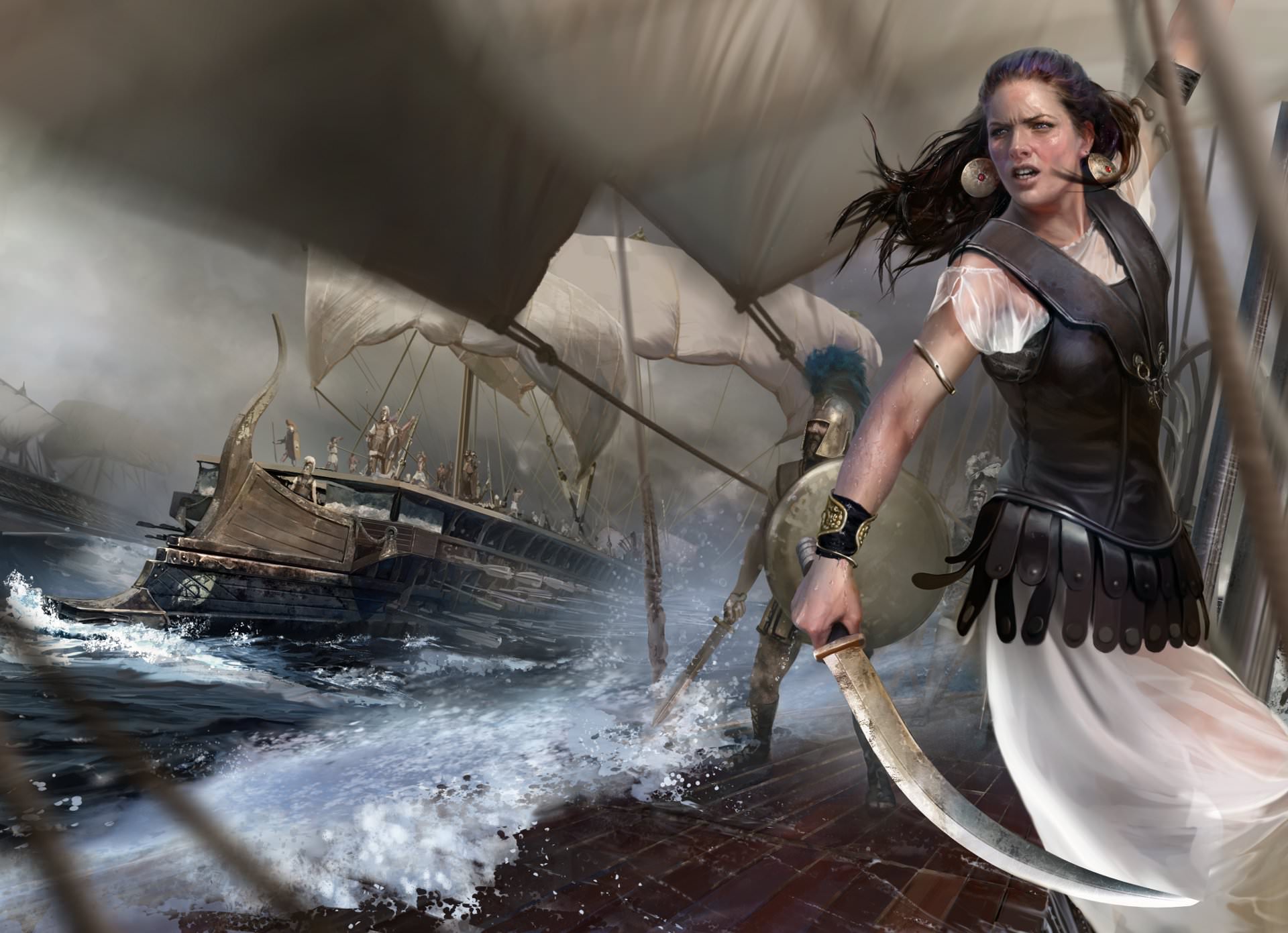
Queen Teuta of Illyria remains one of history's most intriguing figures. Who was Queen Teuta? She ruled during the 3rd century BCE, known for her fierce leadership and naval prowess. Her reign saw Illyria become a formidable maritime power, challenging even the mighty Roman Republic. Despite facing numerous adversaries, she stood resilient, embodying the spirit of her people. Her story is filled with battles, alliances, and a relentless quest for sovereignty. From her strategic mind to her unyielding courage, Queen Teuta's legacy continues to captivate historians and enthusiasts alike. Ready to dive into 35 fascinating facts about this remarkable queen? Let's set sail!
Key Takeaways:
- Queen Teuta was a fierce pirate queen who defied Rome and commanded a powerful naval fleet, leaving a lasting legacy of female empowerment and strategic leadership.
- Despite her eventual defeat, Queen Teuta's defiance against Rome and her influence on later pirate leaders continue to inspire fascination and admiration in modern times.
Queen Teuta: The Pirate Queen of Illyria
Queen Teuta ruled the Illyrian kingdom during the 3rd century BC. Known for her fierce leadership and naval prowess, she left a significant mark on history. Here are some intriguing facts about this formidable queen.
-
Teuta became queen after her husband's death. When King Agron died in 231 BC, Teuta took over the throne, ruling as regent for her stepson, Pinnes.
-
She was known for her naval strength. Teuta commanded a powerful fleet that dominated the Adriatic Sea, making her one of the most feared pirate leaders of her time.
-
Teuta's reign was marked by piracy. Under her rule, Illyrian pirates attacked Roman and Greek ships, disrupting trade routes and causing widespread fear.
-
She defied Roman envoys. When Roman ambassadors demanded she stop her piracy, Teuta reportedly dismissed them, leading to further conflict with Rome.
-
Rome declared war on Illyria. In response to her defiance, Rome launched the First Illyrian War in 229 BC, aiming to curb her power and piracy.
The First Illyrian War and Its Aftermath
The conflict between Rome and Illyria had significant consequences for Queen Teuta and her kingdom. Here are some key facts about this period.
-
Teuta initially had success against Rome. Her forces managed to capture several Roman ships and even some coastal towns.
-
Rome's superior military eventually prevailed. Despite her initial successes, Teuta's forces were no match for the well-organized Roman legions.
-
Teuta was forced to surrender. By 227 BC, Teuta had to negotiate peace with Rome, significantly reducing her power and influence.
-
She retained a small part of her kingdom. As part of the peace treaty, Teuta was allowed to keep a small portion of her territory but had to pay tribute to Rome.
-
Illyrian piracy was curbed. The peace treaty also included provisions to limit Illyrian piracy, which had been a major issue for Rome.
Teuta's Legacy and Influence
Despite her eventual defeat, Queen Teuta's legacy endured. Her story continues to captivate historians and enthusiasts alike. Here are some lasting impacts of her reign.
-
Teuta is remembered as a symbol of resistance. Her defiance against Rome made her a symbol of resistance and independence for many.
-
She influenced later pirate leaders. Teuta's tactics and strategies were studied and emulated by later pirate leaders in the Mediterranean.
-
Her story is part of Albanian folklore. In modern Albania, Teuta is celebrated as a national heroine, with many legends and stories about her bravery.
-
Teuta's reign highlighted the power of women in ancient times. Her leadership challenged the male-dominated norms of her era, showcasing the capabilities of female rulers.
-
She is featured in various works of art. Teuta's image and story have been depicted in paintings, literature, and even operas, cementing her place in cultural history.
The Cultural and Historical Context of Teuta's Reign
Understanding the broader context of Teuta's time helps to appreciate her achievements and challenges. Here are some facts about the world she lived in.
-
Illyria was a diverse region. The kingdom of Illyria was made up of various tribes and cultures, each with its own customs and traditions.
-
The Adriatic Sea was a crucial trade route. Control over the Adriatic meant control over important trade routes between the East and West.
-
Rome was expanding its influence. During Teuta's reign, Rome was rapidly expanding its territory and influence, often clashing with other powers.
-
Greek city-states were also powerful. The Greek city-states, particularly those along the coast, were significant players in the region's politics and trade.
-
Piracy was a common practice. Many coastal communities engaged in piracy as a means of survival and economic gain, making Teuta's actions part of a larger trend.
Teuta's Personal Life and Character
While much of Teuta's life remains shrouded in mystery, some details about her personal life and character have been recorded. Here are a few insights.
-
Teuta was known for her intelligence. Historical accounts describe her as a shrewd and intelligent leader, capable of making strategic decisions.
-
She was a skilled negotiator. Despite her reputation as a pirate, Teuta was also known for her diplomatic skills, negotiating treaties and alliances.
-
Teuta had a strong personality. Her defiance against Rome and her leadership style suggest a strong-willed and determined character.
-
She was a protective mother. As regent for her stepson Pinnes, Teuta took her role seriously, striving to secure his future and the stability of the kingdom.
-
Teuta's appearance is largely unknown. There are no contemporary descriptions or portraits of Teuta, leaving her physical appearance to the imagination.
The End of Teuta's Reign
Teuta's reign eventually came to an end, but her impact on history remains significant. Here are some facts about the final years of her rule.
-
Teuta's power waned after the war. The peace treaty with Rome significantly reduced her authority and resources.
-
She continued to rule until her death. Despite her diminished power, Teuta remained in control of her reduced territory until her death.
-
The exact date of her death is unknown. Historical records do not provide a precise date for Teuta's death, adding to the mystery surrounding her life.
-
Her stepson Pinnes succeeded her. After Teuta's death, Pinnes took over the throne, continuing the Illyrian royal lineage.
-
Teuta's legacy lived on. Despite her defeat, Teuta's story continued to inspire and influence future generations.
Modern Interpretations of Teuta's Reign
In modern times, historians and scholars have re-evaluated Teuta's reign, offering new perspectives on her life and legacy. Here are some contemporary views.
-
Teuta is seen as a feminist icon. Her leadership and defiance against male-dominated powers have made her a symbol of female empowerment.
-
Historians debate her role as a pirate. Some argue that her piracy was a form of resistance against Roman imperialism rather than mere criminal activity.
-
Teuta's strategic acumen is praised. Modern scholars recognize her ability to navigate complex political and military landscapes.
-
Her story is used in education. Teuta's life is often included in history curricula to illustrate the role of women in ancient history.
-
Teuta remains a subject of fascination. Her enigmatic life and dramatic reign continue to captivate historians, artists, and the general public alike.
Queen Teuta's Legacy Lives On
Queen Teuta of Illyria remains a fascinating figure in history. Her reign, marked by both fierce resistance and strategic diplomacy, showcases the complexity of her leadership. Despite facing numerous challenges, she managed to carve out a significant place in the annals of ancient history. Her story, filled with battles against Rome and efforts to protect her kingdom, continues to inspire those who learn about her.
Teuta's legacy is a testament to her resilience and determination. She stands as a powerful example of a woman who defied the odds and left an indelible mark on her people. Her life reminds us that history is full of remarkable individuals who shape the world in unexpected ways. As we reflect on her achievements, Queen Teuta's story encourages us to look deeper into the past and appreciate the rich tapestry of human history.
Frequently Asked Questions
Was this page helpful?
Our commitment to delivering trustworthy and engaging content is at the heart of what we do. Each fact on our site is contributed by real users like you, bringing a wealth of diverse insights and information. To ensure the highest standards of accuracy and reliability, our dedicated editors meticulously review each submission. This process guarantees that the facts we share are not only fascinating but also credible. Trust in our commitment to quality and authenticity as you explore and learn with us.


